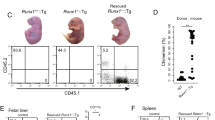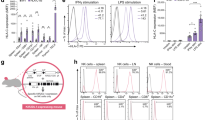Abstract
THE mammalian foetus must differ antigenically from its mother, in normal circumstances, the exception being in highly inbred strains. Consequently, except in matings between inbred mammals, the foetus and the foetal part of the placenta may be regarded as a homograft, and a homograft reaction against the foreign antigens might be expected. However, the antigenically different foetus and placenta are maintained in the uterus throughout pregnancy without eliciting any apparent rejection reaction, although the immunological competence of the mother must be significant during gestation.
This is a preview of subscription content, access via your institution
Access options
Subscribe to this journal
Receive 51 print issues and online access
$199.00 per year
only $3.90 per issue
Buy this article
- Purchase on Springer Link
- Instant access to full article PDF
Prices may be subject to local taxes which are calculated during checkout
Similar content being viewed by others
References
Billington, W. D., Nature, 202, 317 (1964).
Gottfried, B., and Padnos, M., Transplantation Bulletin, 6, 427 (1959).
McLaren, A., and Michie, D., Nature, 187, 363 (1960).
Author information
Authors and Affiliations
Rights and permissions
About this article
Cite this article
JAMES, D. Effects of Antigenic Dissimilarity between Mother and Foetus on Placental Size in Mice. Nature 205, 613–614 (1965). https://doi.org/10.1038/205613a0
Issue Date:
DOI: https://doi.org/10.1038/205613a0
Comments
By submitting a comment you agree to abide by our Terms and Community Guidelines. If you find something abusive or that does not comply with our terms or guidelines please flag it as inappropriate.



